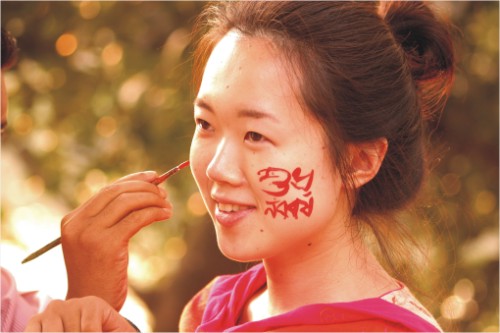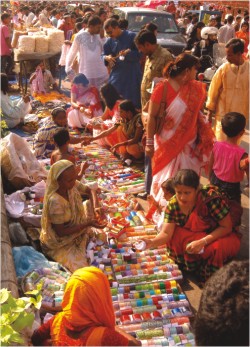|
Spotlight

Hammad Ali

I don't know how many have noticed this, but some of the most important cultural and national festivals in Bangladesh happen to be in months that make it very convenient for the people of the country. To elaborate, our Victory Day is in December, by which time winter is well under way. Celebrations of Victory Day often carry over to the month of January, and at the same time preparations for the International Mother Language Day are also underway. In the month of February, we honour the brave youths who had laid down their lives for the right to have Bangla as their official language.
The weather is in the pleasant transition between winter and spring, and the Ekushey Book Fair becomes a pilgrimage venue of sorts for many. As February comes to an end, we step into the most important month in the history of our nation, the month of the terrible genocide, the month when we started our war for liberation. Celebrations escalate, reaching the zenith on 26th March, but even then all is not over. Right after Independence Day, we get to work preparing for yet another symbol of our heritage Pohela Boishakh, the first day of the Bangla New Year. Once the Boishakhi bonanza is over, the serene, comfortable weather draws to an end, and it's time for the heat, the storms and the rain. Sometimes it almost feels as if nature has scheduled our festivals so as not to let unsuitable weather come in the way of our celebrations.
Although we use the English calendar for most of our daily purposes, I believe that at some level we all feel a link tying us to the Bangla calendar. Speaking for myself, although schooled in English and more comfortable using English in writing and conversation, the Bangla calendar and the Bangla months have left a mark on me in a rather interesting way. You see, if you say April or May, I don't see anything through the eye of my mind. To me, they are just months, possibly with some connotations like exams or vacations, but not really anything more. But the moment you say Boishakh, I can picture the fairs, the music, the food and the throngs of people walking around, basking in the sweetness of everything around them. When you say June or July, again, I think of nothing except maybe someone's birthday. However, as soon as you say ashar or srabon, I can see the dark clouds accumulating in the sky, the thunder roaring, the rain pouring down, washing away all the dirt and dust. This is the small; some may even say inconsequential, way in which my roots seem to have left a mark on me.
Back in school, we were not very big on Boishakh. To us, every holiday was just another chance to get together and spend the whole day playing cricket. None of us ever had the time or the intention (and I do not state this with pride) to attend at Ramna Botomul, immersing ourselves in the beautiful melody of one Tagore masterpiece after another. There are still two Pohela Boishakhs I have never managed to forget though. The first one was in 1997, when the Bangladesh team won the ICC trophy just days before the Bangla New Year. That year, the celebrations took on a whole new flavor, with the gallant winners coming back on the day of Pohela Boishakh. I will get to the second Boishakh I remember later in this article.
 As time went by, our interests went from playing cricket to just hanging out with friends, spending the day together. Coffee world and Pizza Hut had still not made their entry in our city, and we would just hang around the newly made-over Dhanmondi Lake, feasting on fuchkas, chatting and singing in voices that did not have a semblance of proper scale and control. Then in 2001, the unthinkable happened. While thousands of people were in Ramna, enjoying the songs and the colorful parades of the day, bombs exploded and innocents were killed. Bodies were maimed beyond recognition. Hundreds had to be carried off to hospitals, which soon ran out of space to accommodate more patients. Phone networks were jammed as people tried to ascertain the safety of their loved ones. Hundreds drifted off to slow, painful death in hospital beds. Hundreds of others lived on, with the scars of the day haunting them with every step they take. What used to be the heart of all celebrations became the venue where one of the greatest horrors of independent Bangladesh had taken place. As time went by, our interests went from playing cricket to just hanging out with friends, spending the day together. Coffee world and Pizza Hut had still not made their entry in our city, and we would just hang around the newly made-over Dhanmondi Lake, feasting on fuchkas, chatting and singing in voices that did not have a semblance of proper scale and control. Then in 2001, the unthinkable happened. While thousands of people were in Ramna, enjoying the songs and the colorful parades of the day, bombs exploded and innocents were killed. Bodies were maimed beyond recognition. Hundreds had to be carried off to hospitals, which soon ran out of space to accommodate more patients. Phone networks were jammed as people tried to ascertain the safety of their loved ones. Hundreds drifted off to slow, painful death in hospital beds. Hundreds of others lived on, with the scars of the day haunting them with every step they take. What used to be the heart of all celebrations became the venue where one of the greatest horrors of independent Bangladesh had taken place.
When April 2002 came, I along with many of my peers felt apprehensive. What would happen in Boishakh this year? Somehow, our main concern was not the fear of more terrorist attacks. We were more concerned about whether the celebrations this year would be marred due to people being scared to venture out, whether Ramna would be a barren field because people did not want their loved ones to walk into any sort of trouble. Why did we care? I guess it had finally dawned on us gathering at Ramna to sing along with the artists was more than just another musical event. It was more than just another national festival, even. Pohela Boishakh had become the symbol of our independence, our sovereignty. If this year, people backed off on account of fear, we would have surrendered, made first concession to the aggressor. We hoped that such would not be the case. We hoped that people would not be deterred from the celebrations; the place wouldn't be empty, that at least some of us would be there to sing along, bad voice notwithstanding.
Then, the big day arrived. It was the first hour of the morning; on the day we welcome the New Year with music and magic, urging the strong Boishakhi winds to drive away all the unwanted baggage of the year gone by. To our surprise, all of Bangladesh seemed to have reached a consensus without so much as consulting each other. Everyone seemed to have made the decision to defy the terror and bask in the merriment of Boishakh. The place was replete with people, adorned in white panjabees or red and white sarees, lighting up the town with their sheer enthusiasm and their big smiles. As we stood there beholding the crowd, it was all I could do, not to shed tears. This was the place where so many had died, for the “crime” of attending New Year's celebrations last year. Yet this year, this place was once again the heart of the celebration, as if nothing had changed. As the thought occurred to me, I realized that indeed, nothing had changed. We were still the same ferociously patriotic nation, the nation that will sacrifice lives before they have to bow down to somebody. We were still the nation that values our pride more than our lives. Standing there, amidst a crowd of red and white, with songs all around that is the second most memorable Boishakh for me in my small life. For it was at that very moment that I realized Boishakh is more than just another year, more than just another festival. Ever since the first time the celebrations were held despite the Pakistani Government's orders to the contrary, Boishakh has been the token of our strength. It has been our way to show that the enemy can have our death, but they will not have our deference. May we forever display this indomitable spirit, and go on defying all odds to uphold our culture and heritage to the rest of the world. Shubho Noboborsho to everyone!
Copyright
(R) thedailystar.net 2007
|
